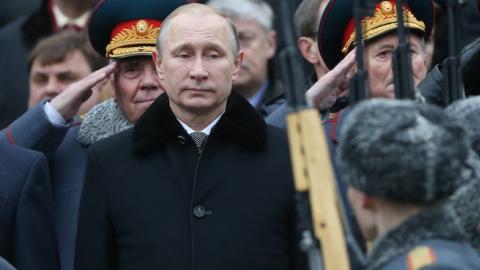The painstaking, Dutch-led international investigation into the deaths of nearly 300 souls aboard Malaysian Airlines MH17 flight has concluded, and the report clearly points the finger at Russia. Such a monstrous crime ought to have been enough to convince the West to re-examine its approach to the Russia problem. Yet the West seems all too often to be trapped by its own ideas about the inevitability, if not desirability, of at least partial engagement with Putin’s regime. That regime, meanwhile, seems to respond to every Western offer of engagement with a fresh round of killings.
A Russian attack on a UN humanitarian convoy in Syria, for example, has again torn to shreds U.S. attempts to find a common ground with Moscow in Syria. The attack, which should be examined for a possible indication of a war crime, came after relentless U.S. efforts to find at least one issue for which “pragmatic cooperation” was possible with Russia.
News of the renewed bombing campaign in Syria came hot on the heels of reports that U.S. intelligence agencies are seriously concerned about covert Russian interference in the presidential election. None of this should come as a shock anymore after the events of the past eight years—including Russia’s wars in Georgia, Ukraine, and Syria. Indeed to look back one cannot help but recognize just how far we’ve come since George W. Bush claimed to have peered into Putin’s eyes and seen his soul. Yet somehow Western leaders still seem to think that the simple solution to dealing with Russia is to find a hitherto elusive common interest in talks with President Putin.
What if this approach is wrong? What if Western leaders are proceeding from flawed premises? What if, all this time, we’ve been wrong about the nature of Putin’s regime, and this misunderstanding is the source of our failures?
If the conclusions we keep arriving at are proven wrong again and again, then it follows that we should revisit our premises. Key concepts of the regime—its pyramid of power; Putin’s role as its creator; the origins of Kremlin politics in the need to shore up domestic power; and the possibility of acceptable alternatives to Putin within the regime itself—all of these concepts and more must be thoroughly re-examined if we are to understand exactly what we are dealing with.
The “Great Man” theory and other methods emphasizing the individual’s impact on history constantly tempts us to locate our problems with Russia in the person of Putin himself. This is a mistake: in Putin’s Russia, more important than the man himself is the system he administers.
Anyone who has spent significant time peering into the nature of the regime can produce copious proofs of this argument. For some time now, researchers, diplomats, and even prosecutors have been comfortable wrapping their heads around the simple truth that the Russian regime is best described as a mafia state. This is a conclusion that follows quite naturally from the profusion of international arrest warrants issued for high-ranking Russian officials. It is not, however, a conclusion that Western politicians feel politically comfortable admitting, as evidenced by the fact that their approach to Russia hasn’t changed.
Unfortunately, most Western governments, applying concepts suitable to authoritarian regimes more broadly, think they are very good at dealing with Putin’s government. A mafia state, however, requires a much different approach than does an authoritarian one. Western democratic leaders, for instance, would have a hard time explaining to voters why they should cooperate with the mafia; yet somehow they expect them to see cooperation with the Russian mafia state as a goal and an asset.
Today Russian intelligence activity and political interference exceeds the levels seen during the Cold War. Moreover, the Kremlin’s dirty tricks and intelligence ops have been conducted not only in those neighboring countries that Moscow inexcusably considers its sphere of influence, but also in France, Germany, and even the United States. Yet any attempt in the West to discuss an appropriate response to these efforts provokes a kind of allergic reaction, as if one were suggesting that the West should resuscitate the Cold War.
The West is still trying to convince itself that there are good guys in Moscow, or even the Kremlin, who will either succeed in forcing Putin to change his destructive policies or spark regime change in Russia. We continue to bet on this outcome because we believe we understand the interests not only of the Russian state but of the Russian elite as well.
The only problem with this approach is that our understanding of Russian interests mirrors our understanding of our own interests. The poor results achieved by more than two years of sanctions against Putin’s regime after the annexation of Crimea should have convinced us that the Russian elite does not share our understanding of their own interests. We should also look to the Kremlin’s latest victories in the Middle East and elsewhere in the international arena, as well as its apparent strength at home.
Russia’s KGB-style mafia state will not agree to wind itself down. It can be stopped, but Western leaders must first re-examine their assumptions about Putin and about Russia. They must also prepare their voters for a long-term standoff, rather than banking on slender hopes for regime change in the foreseeable future.
















